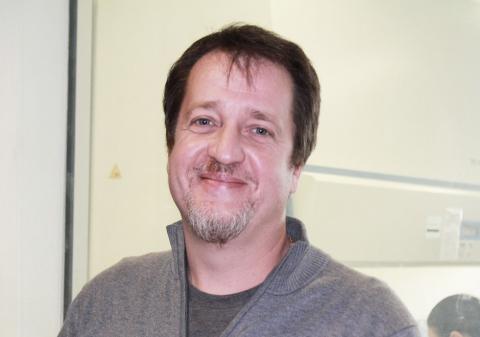
Olivier Delelis: Overcoming the last bastions of resistance to AIDS
Olivier Delelis is a researcher at the Laboratory of Biology and Applied Pharmacology (LBPA - Paris-Saclay University, ENS Paris-Saclay, CNRS) and has been involved in AIDS research for over 20 years. Within the "Biophotonics of Molecular Interactions" team, he is specialized in resistance mechanisms to the latest generation molecules that treat patients suffering from the human immunodeficiency virus (HIV).
Within the Laboratory of Biology and Applied Pharmacology (LBPA - Paris-Saclay University, ENS Paris-Saclay, CNRS), Olivier Delelis' multidisciplinary and multitechnical team is particularly interested in the problems of HIV resistance to integrase inhibitors. These molecules inhibit the integration of the retrovirus genome into the human genome achieved through the integrase viral protein. In close collaboration with clinicians at La Salpêtrière Hospital, the national AIDS reference centre - about 100 patients are treated there - the researcher characterized resistance mutations that appeared in the integrase gene during the development of the first inhibitors, such as raltegravir in 2007.
Another way of replicating the virus
"Surprisingly, we found that HIV is resistant to new integrase inhibitors, such as dolutegravir, without creating a mutation in the protein gene, but in other parts of the viral genome," he recalls. Based on the sequencing of the protein gene, the team carried out a biochemical and bio-cellular analysis, and two years ago, in collaboration with the clinicians at La Salpêtrière Hospital, broke through the way this resistance operated. "This resistance implies a profound modification of the virus replication mechanism. The substrate resulting from this modified replication mechanism is no longer a linear DNA, as commonly described, but a circular molecule. This type of non-integrated molecule allows both the virus to replicate itself and to bypass the step of integrating its DNA." This mechanism is largely underestimated due to the immense therapeutic progress made with the new molecules on the market. "To eradicate HIV once and for all, we would need to understand all its replication pathways," says Olivier Delelis.
From Cachan to Saclay
After ENS Lyon, Olivier Delelis defended a thesis on retroviruses in 2002 at the Cochin Institute. Two years later, he completed a post-doctoral fellowship at the LBPA, and then he became a research fellow at the CNRS in 2009. He joined Eric Deprez's team and became research director in 2017. The laboratory will move with the ENS Paris-Saclay to the heart of the Paris-Saclay University in 2020. This will strengthen its collaborations, give it access to other technologies, extend its network and increase its visibility. "I have always been intrigued by the complexity of the human ecosystem. How can such a small virus kill an individual made up of clusters of billions of cells?" says the researcher.
Sidaction Days
Olivier Delelis draws on his motivation in the hope of offering better living conditions to patients and one day eradicating AIDS. "The alternative pathways of virus replication occur when new molecules appear. It is therefore not so easy to thwart. So we must continue our research efforts," he says. For the past three years, the LBPA has been organizing Sidaction Days. "This is an opportunity for researchers, including those in the laboratory, to raise awareness among students and the general public on the latest scientific advances in the fight against HIV, not to mention the prevention aspect. The 2019 Sidaction Day was a great success. 200 people came to listen to Françoise Barré-Sinoussi, who received the 2008 Nobel Prize for Medicine with Luc Montagnier for the discovery of the virus. "The next edition will be held in Saclay on December 1, 2020, which will coincide with International AIDS Day.
